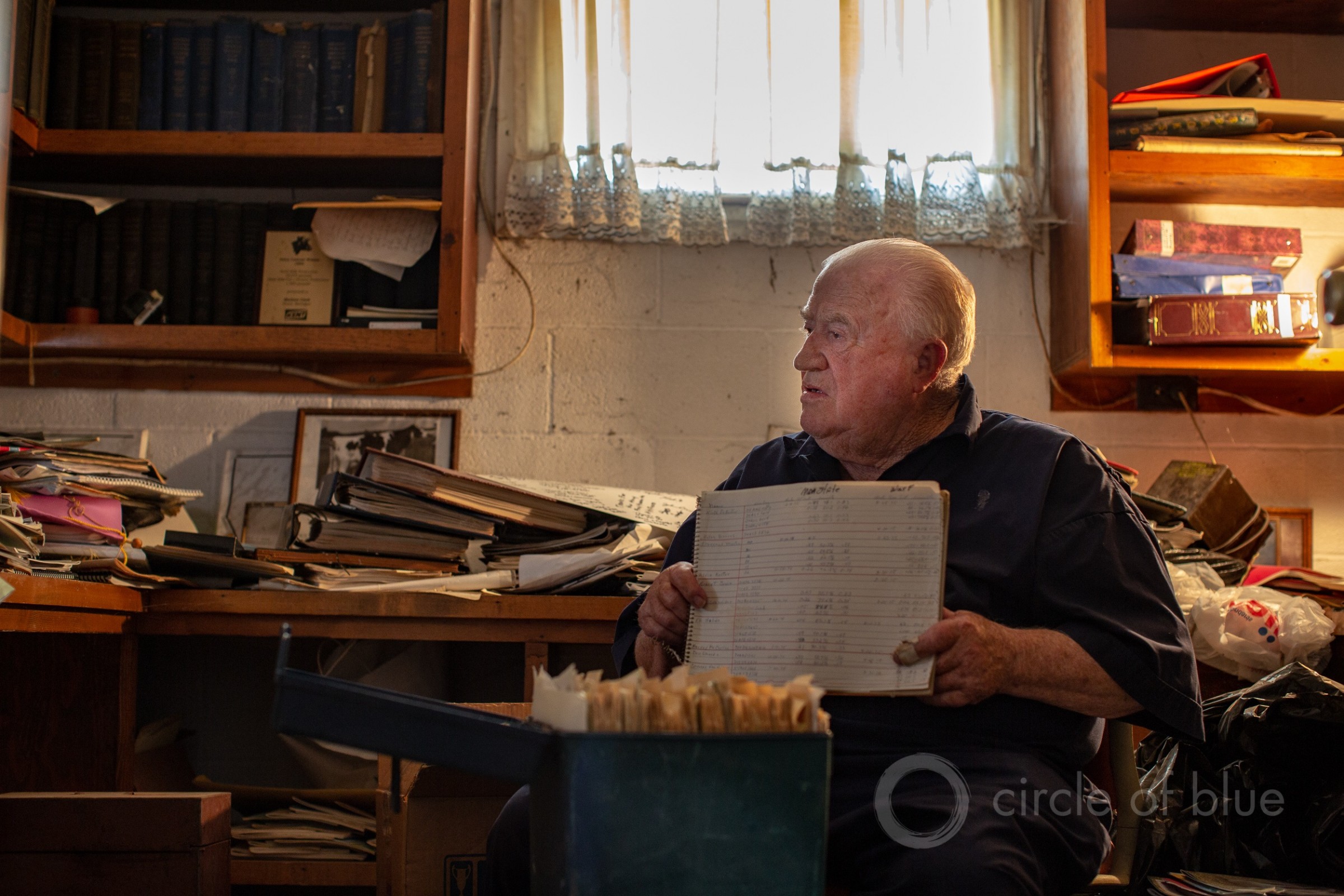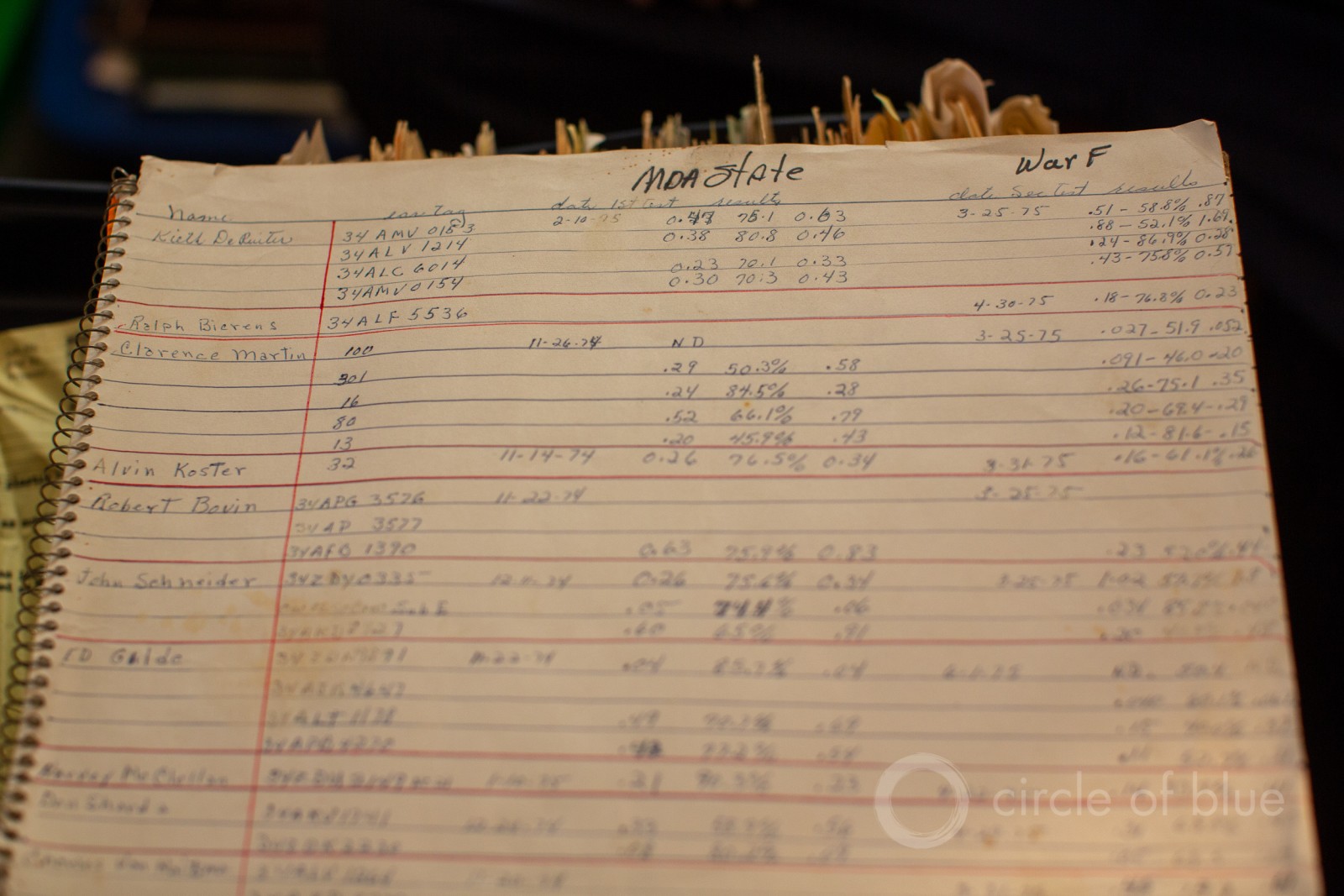
Alpha Clark was there when they started to bury the carcasses. The tomb – a trench, actually – was in a field in remote southeastern Kalkaska County, a place of quiet amid the pine forests of Michigan’s Lower Peninsula. Photo © J. Carl Ganter / Circle of Blue
Contamination of the food-supply chain in Michigan in the 1970s was one of the worst mass poisonings in U.S. history. The events still resonate today.
By Brett Walton, Circle of Blue
Alpha Clark was there when they started to bury the carcasses. The tomb – a trench, actually – was in a field in remote southeastern Kalkaska County, a place of quiet amid the pine forests of Michigan’s Lower Peninsula.
“Boy, they buried a ton of them up there,” Clark recalled during an August visit at his home. “I used to know the numbers but I don’t remember the total number. They took cattle. They took sheep. They took hogs. They took chickens. They took milk. They took eggs. Everything is buried in there.”
Clark is a veterinarian who lives in McBain, Michigan, where he has doctored sick animals for six decades. In the late 1970s, he was at the frontlines of a chemical contamination crisis that engulfed the state and was one of the worst mass poisonings in U.S. history.
Polybrominated biphenyl, or PBB, was a fire retardant manufactured by Michigan Chemical Corporation, in St. Louis, Michigan. An error at the factory in the spring of 1973 changed the state’s health history. Workers mistakenly placed bags of PBB, a highly toxic chemical, in a shipment of livestock nutritional supplements. The supplements were destined for a Farm Bureau center where they – and the PBB – were mixed with cattle feed and distributed to farmers across the state.
Cows that ate the contaminated feed started acting strangely. Farmers near McBain called on Clark for assistance.
“We knew something was wrong,” Clark said about the cows he treated. “The farmers and I knew something was wrong, and that’s the truth. We didn’t know what was wrong. We knew that the animals weren’t like they used to.”
Tens of thousands of animals were stricken ill. Cows developed digestive problems. They stopped eating and milk production dropped. Calves died. The chemical worked its way into the fat of the mothers and then into the milk, which was shipped to supermarkets. Soon, PBB was found in the breast milk of Michigan women.

Photo © J. Carl Ganter / Circle of Blue
Researchers today are testing whether the harm from PBB exposure can be inherited, passed from mother – or father – to child.
Early results indicate that is the case.
At the height of the crisis, the state quarantined herds and then, finding no quicker or better option, ordered contaminated livestock to be exterminated. Starting in 1974, the carcasses — more than 32,000 cattle, pigs, sheep, and poultry — were brought to the Kalkaska pit and buried.
The Michigan Chemical plant in St. Louis that produced PBB did not last much longer. Closed in 1978, the site was placed on the federal Superfund list five years later because of contamination in the Pine River, which abuts the property, and in groundwater. Cleanup is still ongoing.
The Department of Environmental Quality began monitoring groundwater around the Kalkaska burial site in 1977. The site had been selected because it was three miles from the nearest river and a natural underground clay layer above the water table would impede any contamination that escaped the lined pit.
The department stopped monitoring in 2015 because of “minimal likelihood of movement” of PBB off the site, according to Nick Swiger of the DEQ. One monitoring well in the shallow aquifer registered a low-level PBB detection in 1984, but nothing before or since.
“We stopped monitoring because it’s been so long and nothing has been found,” Swiger said.
Photos © J. Carl Ganter / Circle of Blue | Video © Rob Auchincloss / Circle of Blue
Brett writes about agriculture, energy, infrastructure, and the politics and economics of water in the United States. He also writes the Federal Water Tap, Circle of Blue’s weekly digest of U.S. government water news. He is the winner of two Society of Environmental Journalists reporting awards, one of the top honors in American environmental journalism: first place for explanatory reporting for a series on septic system pollution in the United States(2016) and third place for beat reporting in a small market (2014). He received the Sierra Club’s Distinguished Service Award in 2018. Brett lives in Seattle, where he hikes the mountains and bakes pies. Contact Brett Walton
Related
© 2023 Circle of Blue – all rights reserved
Terms of Service | Privacy Policy




